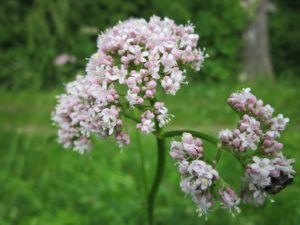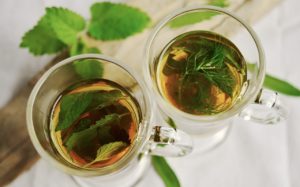Valerian officinalis For Restful Sleep, Insomnia and Anxiety
Often times those with mental health issues such as depression or anxiety also struggle with a sleep issues. Not being able to sleep can make matters much worse. Getting a deep, restful nights sleep on a regular basis is critical for mood support.
Valerian is known for its calming the mind and sleep properties. If you have sleep issues, finding the cause is always best but valerian can be useful during the process or if you have a night here and there when you need it. While using valerian with other herbs is impactful, try valerian first on its own as it may not be the right herb for you.
If you are using prescription sleep medications, don’t use valerian! There are no known drug interactions but please wait until you are off the medication.
Historically Valerian has been used for digestive problems, liver issues and nausea. By the 18th century is was known as a sedative and also used for an upset and “restless” digestive tract.
This is a plant native to Europe and parts of Asia and the root is used for medicinal properties. It is grown wild all over these parts of the world. It is considered to be an antispasmodic herb meaning that it helps to relax the involuntary muscles of the body.
For Sleep and Anxiety
Valerian in known for its use as a sleep aid, its relaxing and sedative properties. It is, as a result, most often used for its sleep benefits. Since it relaxes your muscles and calms your nerves, it is also used in place of anxiety medications for some. It is known to increase GABA in the body which is your calming neurotransmitter and this is why it can be so helpful as an aid for anxiety.
While many use valerian root as a sleep aid, it is best to test it out first to see how you respond. Not everyone responds to herbs in the same way. For some it can have the opposite effect.
What I like about Valerian as a sleep aid is that is does not suppress REM phases of sleep which some medications do. For instance, on a sleep medication, you may get a full night of sleep but you may not get that “deep” sleep that you need. Thus you may still feel tired and fatigued throughout the day, not to mention the side effects and waking up feeling like you are hung over. Valerian, instead helps to promote a normal sleep pattern.
For those that are familiar with Ayurvedic principles, Valerian root works best for Vata constitutions. For Pitta types, Valerian may not have a sedative effect.
It can make sleep more restful if you are someone who wakes frequently or has difficulty getting into a deep sleep. For those that have difficulty falling to sleep it can make the transition easier and can calm the restless mind. It will not make you sleep longer and you will not wake up with that “drugged feeling”. For sleep, adding lemon balm to valerian may enhance the sleep benefits.
Valerian Benefits and Side Effects
While is it known for its sedative, calming properties and most often used as a sleep aid, it can also be useful for headaches, ADHD, stress, restlessness, anxiety, muscle and arthritis pain, and menstrual cramping to name a few.
Are there side effects? Not everyone reacts the same to valerian. I have seen some take this who have insomnia and fall right to sleep and others who it keeps them up with a wired feeling. For some it can casuse heart palpitations and nausea, stimulating the nervous sytem instead of calming it. If this is the case for you, Valerian is not the best herbal choice and you should switch to a different herb for sleep (of which there are many!)
Don’t over do it on the dose as too much, for some, can cause stomach irritation, nausea and headache. That being said, the dose for Valerian is higher than for some other herbs (see “Ways to Take” below for more information).
Look for a product that uses the fresh herb instead of dried as the dried herb may casue hyper side effects. Some people can only get a response if they use the tincture.
Try the herb on a weekend or when you do not have to work in case the herb isn’t the best choice for you. We all respond differently to herbs so it can be trial and error finding the one suited for your body. I find that valerian works best for those with a depleted immune system and weak adrenal function.
Is it safe?
Yes, Valerian is a safe herb and in fact, is one of the most researched herbs. As of now, there are no known drug-herb interactions with Valerian use. Always check with your health professional if you are on medications to be safe.
Yes, I know I just said it is a very safe herb-BUT if you are on a sedative sleep medication, don’t add in an herb to help you sleep. Instead focus on the root cause of your sleep issues, work with your doctor to get off the drug and then add in the appropriate herbs and supplements.
- “Do not drive or operate machinery if you plan on using Valerian, due to its sedative nature. It is best used when you are ready to settle in and go to bed.” Although you will hear this statement often with Valerian root, in actuality is has been shown to NOT impair the ability to drive or operate machinery. Although, that being said, it is best to first try the herb when you are home and not going anywhere to see how you respond. When I did a “trial of it”, I took it and so did my two sons. One son and I were wired (it was not the right herb for us), then we couldn’t find my other son. He was “out cold” in a chair (and he is the one who has had issues with sleep).
- It is a safe herb that doesn’t lead to addiction or dependence on the herb.
- Not all herbs are safe during pregnancy however according to Alan Gaby in the Natural Pharmacy, it is safe to take in pregnancy.
- Do not give it to children under 3 years old
- Avoid if you have bi-polar, schizophrenia or other mental health issues that have a manic phase.
- If you are already on sedatives, anti-anxiety meds or anti-depressants, you should consult with your doctor first.
Ways to Take Valerian
In capsules, look for 300-500 mg. amounts of concentrated valerian root (standardized to at least .5% volatile oils. Take it 30-60 minutes before bed time.
If taking in an alcohol based tincture, take 5 ml. before bedtime. This is equivalent to 1 tsp. This higher dose is needed to reap its benefits. Some people may need up to 2 tsp. prior to bed time.
I like to add hops, passion flower and lemon balm to the mix to enhance sleep and calm the mind. If you have hypothyroidism limit the amount of or avoid lemon balm as it is known to suppress thyroid function. (If you cannot find a valerian blend, you can buy all the tinctures or loose herbs separate and make your own tincture blend or tea blend)
To make valerian root tea, steep 2 teaspoons of the dried root in one cup of hot water for 10 minutes. (roots need to steep longer than aerial parts of a plant) Strain and drink. If you are using this as a sleep aid, consume 30-60 minutes prior to bedtime. Again, you can add other herbs to the mix to enhance sleep.
The root has a distinct aroma. Some like the scent, others do not. If you do not like the odor and taste, add a bit of raw honey or pure monk fruit to the tea.
Where to Buy
Choose organic valerian root and there are many good companies that sell organic herbs. I like to buy several herbs and then make a blend for tea versus taking only one herb for sleep or anxiety. But before you make a blend, try valerian on its own to know how you respond to the herb. Store your herbs in a cool, dark place. They should last for 6 months to a year if stored this way.
Has Valerian helped you? If so (or not), I would love to hear from you!
Sources
Balch, P. ( 2012) Prescription for Herbal Healing. 2nd Edition. NY: Avery Publishing
Cech, R. (2016) Making Plant Medicine. Oregon: Herbal Reads
Gaby, A.(2006) The Natural Pharmacy. Revised and updated 3rd edition. NY: Three Rivers Press
Hoffman, D. Medical Herbalism. (2003) The science and practice of herbal medicine. VT: Healing Arts
Press.
Mars, B. (2007) The Desktop Guide to Herbal Medicine. CA: Basic Health Publications
Moore, M. (1996) Herbal Tinctures in Clinical Practice. 3rd Edition. AZ: SW School of botanical Medicine
Skenderi, G. (2003) Herbal Vade Mecum. NJ: Herbacy Press
Winston, D. & Maimes, S.(2007) Adaptogens: Herbs for Strength, Stamina, and Stress Relief. VT: Healing
Arts Press.




Leave A Comment
You must be logged in to post a comment.